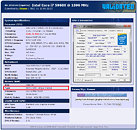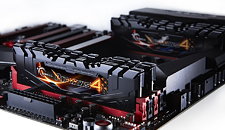Monday, January 12th 2015

G.SKILL Breaks Fastest DDR4 Memory Frequency Overclock at 4255MHz
G.SKILL International Co. Ltd., the world's leading manufacturer of extreme performance memory and solid-state storage, is extremely excited to announce a new memory record for fastest DDR4 memory frequency, set at 4255MHz CL18-18-18! This amazing achievement was attained on the Asus Rampage V Extreme motherboard (X99 chipset) and with the Intel i7-5960X processor, all under sub-zero liquid nitrogen cooling. Below is a screenshot of the record validation by CPU-Z (validation).


39 Comments on G.SKILL Breaks Fastest DDR4 Memory Frequency Overclock at 4255MHz
Realy, do you get paid to do this?
Which in turn company's don't tell you when they change them later on in production ( asses ).
I'm not a "youngster" and I see the clear benefits to what is happening, the advancement that works will be copied and through proliferation will result in better performance across the mainstream sector and not just the enthusiast, much the same way there was no point in upgrading to DDR3 at first DDR4 will take a generation or two before it becomes fully viable as a replacement.
Also we must adopt faster, lower voltage RAM, the amount of on die termination and signalling voltage is going to make or break newer process nodes for CPU's as the memory controller is on die.
My 1100T begs to differ that beyond 1600 has no benefit, wrenching down the timing and increasing the speed with higher rated memory and running it close to 2000Mhz made a significant difference in bandwidth intense applications, Intel chips thrive with faster RAM, but new AMD has a serious cache latency issue however.
They realize that this is just a press release proclaiming a high overclock on a RAM module
They realize that this isn't realistic.
They realize that this is a marketing gimmick.
It really doesn't need explanation or finger pointing to theoretical "dumbers" that probably don't really exist.
At the end of the day, people can spend their money how they want, but stuff like giant Corsair Dominator DIMMs are good for little more than showing off the size of your e-peen, not any realistic gaming FPS gains.
At the end of the day though, en.wikiquote.org/wiki/Talk:Bill_Gates 640Kb was enough, 1Ghz was huge and many of us "oldsters" probably remember when we thought it was fast enough, hell, I remember getting my hands on a AMD 500 Mhz and overclocking it to 550 and how I thought that was unbelievable at the time SDR RAM 133 in matched pairs to reach up to 150Mhz on some configurations!!! www.dansdata.com/fastram.htm
I'm all for more performance, but the reality is, no games on the market today or in the foreseeable future (don't kid yourself, gamers are the market for Corsair and G.Skill) actually benefit from high RAM speeds at realistic resolutions. That's why review sites, including TPU, run their RAM benchmarks at sub-1080p resolutions to isolate from the GPU. At 1080p and up, the FPS difference in virtually all modern games between 2133mhz and 3000mhz are from less than 2% to a statistical margin of error.
Again, gamers should spend money on a faster GPU or more RAM, not faster RAM
I keep using 2133mhz, because that seems to have replaced 1600mhz DDR3 as the entry point into building a gaming desktop, and the price difference between it an 1600mhz is slight enough to make the splurge of $20 to $40 more pretty inconsequential. Not the $150 to $300 jump you'd need to make to get into the 2800mhz+ range.
I guess HWBOT is totally pointless as well, and we should all be happy using locked e-machines.
I have multiple 3.0 drives that run well over 100MBps, makes coping large files a breeze.
If you want to get pedantic, and it seems you do, the difference is easily seen on any number of publicly available benchmark/system validation submissions. Why do you think that CPU-Z validations are a relatively common signature addition if not as an expression of individuality?
>inb4 "Your specs say G.Skill". You are right, but it was on sale when i bought it and i was trying to be accurate in the specs
Last time I checked, no one was doing anything in sub zero temps..
Show me 5 gigs on all cores and I'll care.
Memory isn't doing anything noticeable passed 2133 anyway.
and yeah, this may not be an out of the box application, but IT PROVES that it can be done. in a couple of years, 4200mhz ddr4 may be available for purchase, and it very well could be useful at that time.
It stuns me how stupid some people on this forum can be these days. do most people really think that a shitty p4 hp and GPUs from the 90s are all people need, and that power users just dont exist?
Imagine a world where no one bought 4K displays when they were $10.000 because they would be "dumb." Do you think display manufacturers would be willing to invest in 4K if they didn't get any return on their investment the first 5 to 10 years?
If your argument is that people that are early adopters or innovators are dumb, because they pay too much, you're certainly not a technology innovator as people are willing to invest more to get a certain advantage (no matter how small it is.) Why get new GPUs because a 770 is fine for 1080p?
I do however, agree that these benchmark numbers are completely irrelevant for 99.998%(maybe even more) of the people in this world, but the very small percentile of people that do take interest in this are paving the way for overall faster and cheaper products on the market that have an upstream battle in the world of legacy technologies that is the "modern" PC.
edit: there are some great resources on marketing and product development and just about everything is based on Rogers' bell curve.
en.wikipedia.org/wiki/Technology_adoption_lifecycle
Your position in the curve is decided by your keenness for technology, willingness to adopt and, critically, financial abilities.
Shazam?
Look at the Windows 8 shit. Despite all negativism to it, MS will still find a way to make it by giving, for instance, Windows 10 for free or very low prices.
But it is not only this, for sure.
The leading corporations decide where to go no matter what the cost and efforts might be.As far as I remember, faster memory is especially beneficial for APUs.